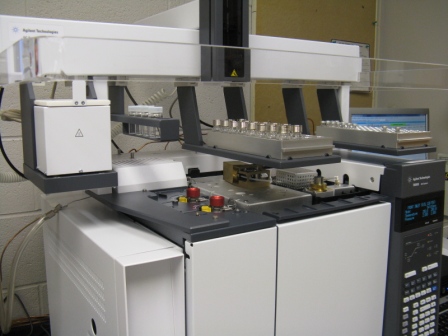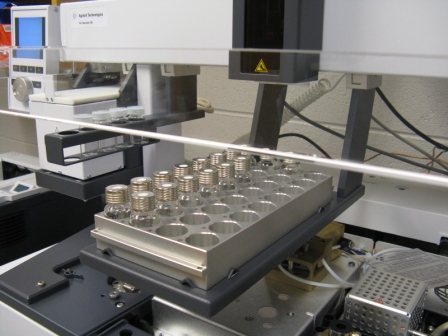Dr. Barb Zeeb, Royal Military College of Canada at ASUIn 2024, an exciting development at ASU involved the replacement of a manual injection 5890 GC/5972 MSD. This was replaced with an 8890 Gas Chromatograph with a 5977C Mass Selective Detector. The new instrument came equipped with a full PAL RSI 120 auto-sampler with SPME fibre conditioning module and added agitator modules, Helium conservation module, ITEX-3 dynamic headspace module and an enhanced 4-year service contract. Mesha Thompson and Paula Whitley, ASU at the installation of Dr Zeebs new GCMS. This wonderful addition came about from our long-time association with Dr Barb Zeeb. The process was started for the acquisition in May 2022 for the 2023-24 fiscal year, through a capital infrastructure grant (for $220K) at the Royal Military College (RMC) and was awarded in Jan 2024. The instrument was installed in March 2024. This instrument has already significantly assisted ASU staff with routine analysis (GC-MS SPME) and will provide Dr Zeeb’s students with specialized capabilities. As part of the collaboration between Dr Zeeb and Dr Cairns, and with approval from RMC, this equipment was installed, maintained, and utilised at the ASU facility. Methods were updated for this instrument and CALA performance samples successfully analysed.
What is GCMS and what is it used for? Agilent 8890 GC/5977C MSD Details
|
Smith Engineering at Queens University and the ASUIn 2013, the ASU assisted Dr. Kevin Mumford in his decision to purchase a GC with FID, ECD and TCD detectors. An Agilent 7890B GC with a 'high end' GC Sampler 80 auto-sampler was obtained through the RFP process. The auto-sampler fully automates solid phase micro extraction (SPME) techniques.
Dr Kevin Mumford at Smith Engineering With the addition of a thermal conductivity detector (TCD) to the other GC detectors used at the ASU, we have the capability to test for some simple gases (such as methane and CO2). Dr. Mumford's students currently use this equipment for their research.
Dr. Barb Zeeb, Royal Military College of Canada (2)The ASU currently maintains a 6890 N GC with an electron capture detector (ECD) and a 5975 mass selective detector. This equipment belongs to Dr. Barb Zeeb (Royal Military College - RMC) and is used by both the ASU and Dr. Barb Zeeb's graduate and undergraduate students working on a variety of different research topics. 6890 GC with 5875 MSD and ECD Dr Barb Zeebs (older) GCMS instrument.
|
Research Partnerships
Oct 08, 2024

